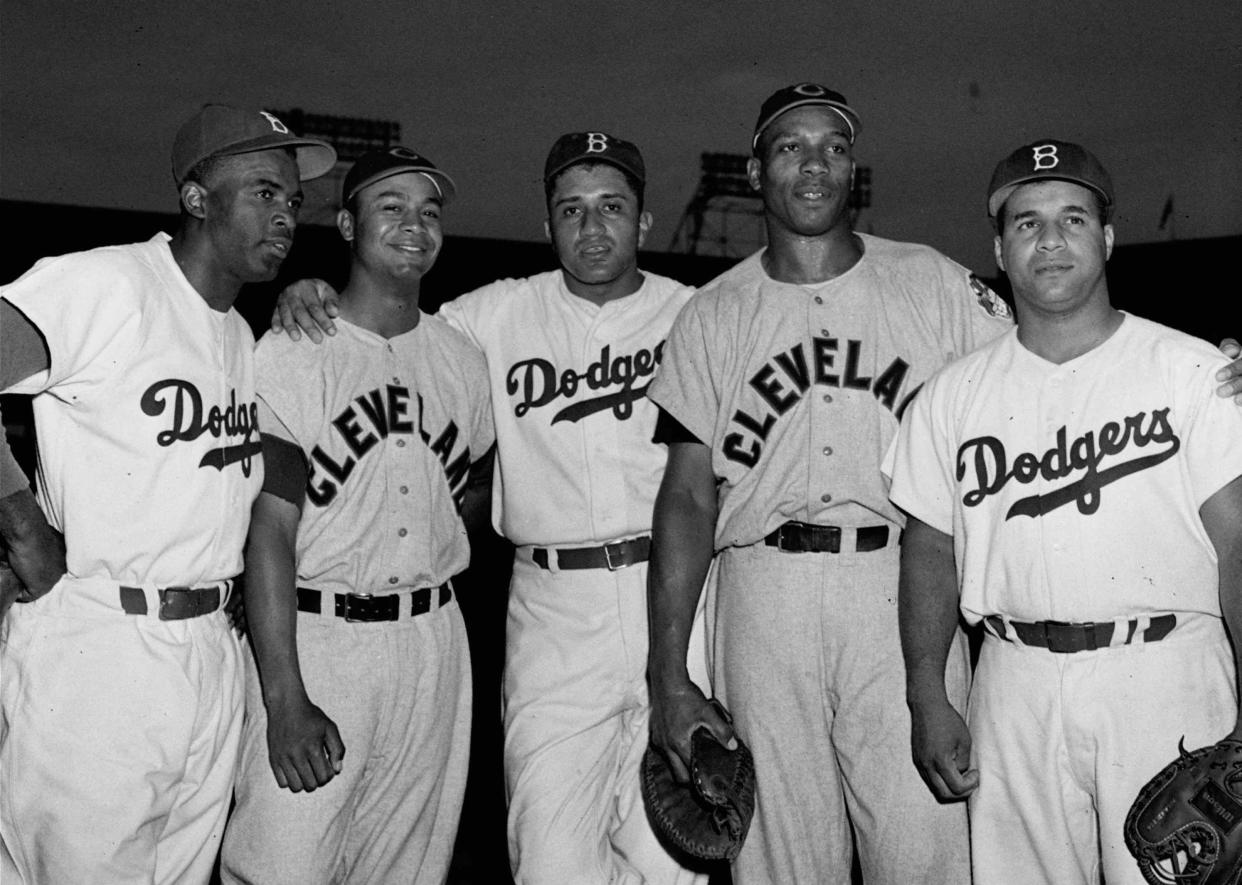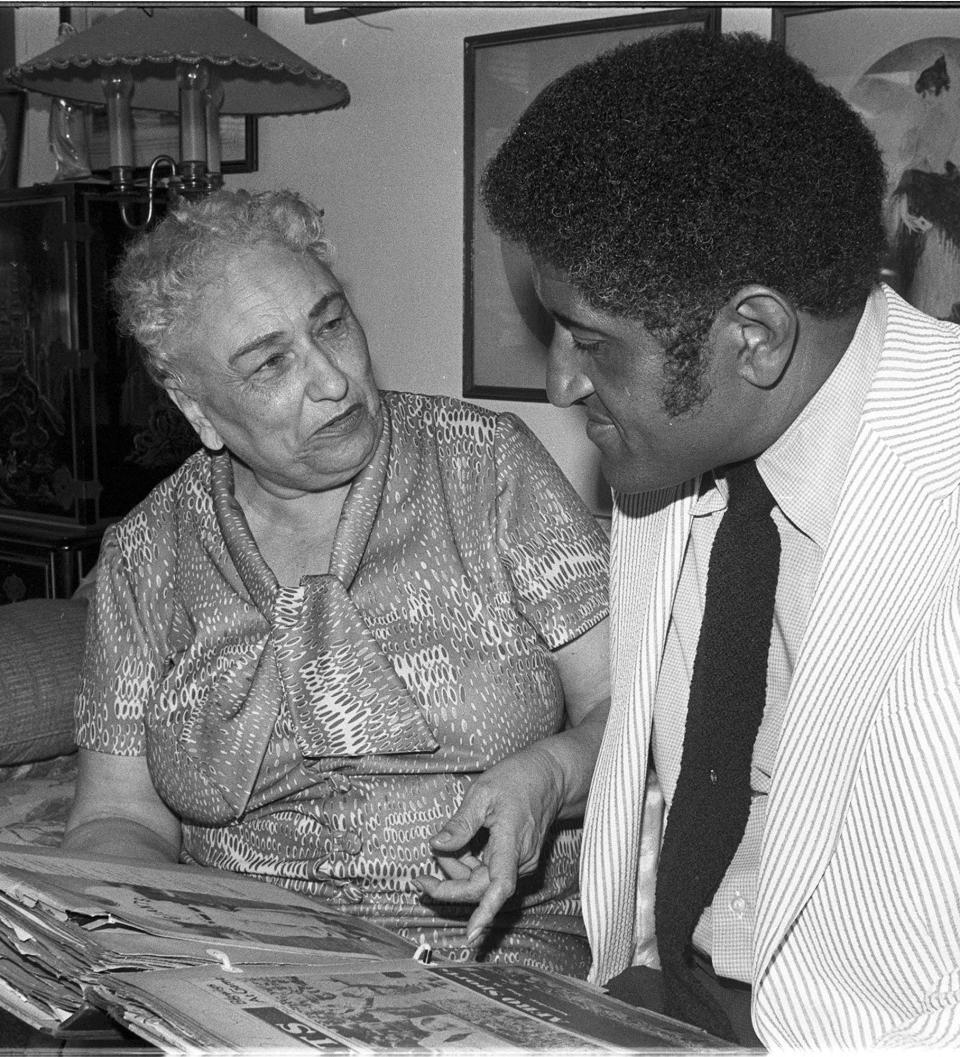'We may wake up some morning with no ball club': Integration assured demise of Negro league baseball

In February for Black History Month, USA TODAY Sports is publishing the series "28 Black Stories in 28 Days." We examine the issues, challenges and opportunities Black athletes and sports officials continue to face after the nation’s reckoning on race following the murder of George Floyd in 2020. This is the third installment of the series.
Effa Manley wasn't happy about losing Don Newcombe, so she wrote the Brooklyn Dodgers to complain.
The Newark Eagles owner had expected to renew Newcombe's contract until Branch Rickey swooped in to sign the Negro league pitcher in 1946 as part of his effort to integrate Major League Baseball.
Manley opened her April 9, 1946 letter saying she was "elated" Newcombe has been selected as "one of the pioneers" and praised Rickey as a "crusader" but quickly turned to her concerns.
"We would be even more enthusiastic, if ... you had only (given) the owners of the Newark Eagles the courtesy of negotiating with us for the services of this valuable player," Manley wrote, saying she hoped "a more friendly, ethical, and equitable handling of similar situations" could be established moving forward.
"Effa Manley had the guts to stand up to Branch Rickey," Bob Kendrick, president of the Negro Leagues Baseball Museum, told USA TODAY Sports. "As much as the Negro league owners saw her as this mettlesome know-it-all, when it was time to send somebody to fight with Branch Rickey, they sent her."

But Rickey never responded to Manley's letter.
"Rickey had very little respect for Negro league contracts," Kendrick said. "He was not going to pay. Rickey’s idea was to come into the Negro leagues and essentially raid it of its star talent without compensation."
So, Manley took her concerns directly to baseball commissioner Happy Chandler, writing on April 24, 1946 that it was "most important that some plan be discussed whereby possible litigation and ill-feeling can be avoided."
Manley, like her fellow team owners, understood the potential breaking of MLB's color barrier eventually would mean the demise of the Negro leagues.
"We may wake up some morning with no ball club," Manley wrote in her letter to Rickey, "and with our investment of years practically wiped out."
Manley's predictions proved correct.
After Jackie Robinson on April 15, 1947 became the first African American to play in the majors since 1884, the Negro National League disbanded prior to the 1949 season with several teams joining the Negro American League, which managed to limp along until 1962.
"It wasn't a matter of if," Kendrick said, "it was simply a matter of when Black baseball was going to die."
Negro league and MLB team owners had financial interest in status quo
Born on Feb. 13, 1920, the Negro National League was the product of a gathering of Rube Foster and seven other Black baseball team owners at the Paseo YMCA in Kansas City, Missouri. The Negro American League formed in 1937 with eight teams.
Kendrick says the Black press also helped push Black teams to organize into leagues because it believed Black baseball needed a governing body that mirrored the majors in order to "survive and thrive."
Later, the same Black press pushed to integrate baseball.
"The question that arises as you take a deep dive examination of the case is a very simple question: Who defines progress? And in the eyes of the Black press progress was seen as assimilation into Major League Baseball," Kendrick said. "And it came at the cost of basically destroying a league that you owned ...
"I tell folks all the time the Negro leagues took one for the team. And those Black owners really took one for the team."
Negro league team owners were not the only baseball officials with a vested financial interest in the status quo.
Major league team owners also were making money off the Negro leagues by renting out their stadiums for games. The New York Yankees, for example, "netted nearly $100,000 per year from rentals and concessions in connection with Negro league games" at Yankee Stadium, as well as stadiums in Kansas City, Newark, New Jersey and Norfolk, Virginia.
"It is unfortunate that groups of political and social-minded drum-beaters are conducting pressure campaigns in an attempt to force major league clubs to sign Negro players now employed by Negro league clubs," New York Yankees president Larry MacPhail wrote in a letter to New York City Mayor Fiorello La Guardia, who had appointed a committee to study the issue of "The Negro in Baseball."
Compensation not enough to save Negro leagues
Other Negro league team owners were not as vocal as Manley, a civil rights activist who in 2006 became the first woman inducted into the National Baseball Hall of Fame. They knew they could not be seen as standing in the way of progress.
"If they stand up and they’re the ones that are trying to stop the integration of baseball, guess what Blacks folks are going to say? 'Why are you holding us back?' " Kendrick said. "And it wasn’t a matter of them trying to hold us back. It was them trying to protect their business. This was their livelihoods. This was how they made their living. And they had to essentially kind of lay in the background and watch this thing kind of dismantle."
This was particularly true, Kendrick said, of Kansas City Monarchs owner J. L. Wilkinson, who was white.
"There’s no way that this white man who made his entire living in Black baseball can be the face of trying to block what Black folks in this country have been waiting on, for a Black man to play in the major leagues," Kendrick said. "If he does that, that Black fan base that had been so loyal to him, they’d turn their backs on him right away. So, publicly, he said all the right things. Privately, he is seething. And he’s not necessarily seething because a Black man started playing in the major leagues, but man, this Black man you’re going to take away from me is going to hurt my business. And he was absolutely right."
One irony of the floodgates Rickey opened by signing Robinson, is that "organized baseball" was still fending off the efforts of the Mexican League, which had been raiding the majors, enticing players to jump their contracts to play South of the Border.
Rickey was all too willing to raid the Negro leagues of players under contract, much as the Mexican League had done to MLB.
"That’s exactly what’s going on," Kendrick said. "They (Mexican League teams) were starting to bring all this talent to Mexico, and they essentially do the same thing to the Negro leagues."
Manley fought for the Negro leagues to be compensated when players left for the majors and her efforts paid off when Cleveland owner Bill Veeck paid the Eagles for signing Larry Doby, who became the first African American to play in the American League on July 5, 1947.
"That opens the door for Negro league owners to start selling their star players to the major leagues," Kendrick said, "but it also signals the demise of those Negro leagues."
The demise of the Negro leagues
In the years following Robinson's MLB debut, the talent drain from the Negro leagues was immediately obvious as former Negro league stars began winning MLB's yearly awards.
Robinson was the inaugural MLB rookie of the year winner in 1947. After the award was given out in both the American and National leagues beginning in 1949, half the rookie awards over the next five seasons went to former Negro league players: Newcombe (1949), Sam Jethroe (1950), Willie Mays (1951), Joe Black (1952) and Jim Gilliam (1953).
The Most Valuable Player awards were just as striking. Beginning with Robinson in 1949, former Negro leaguers won nine of 22 league MVP awards through 1959.
Robinson and Dodgers teammates Newcombe and Roy Campanella won the award five times in eight seasons from 1949 to 1956, with Campanella winning it three times.
"You couldn’t maintain two separate leagues when the one league was basically siphoning off the great talent from the Negro leagues," Kendrick said. "All this great talent that had been part of the Negro leagues were now moving into Major League Baseball, so there’s no way to maintain (the Negro leagues)."
By the fall of 1948, it was clear the Negro National League was on life support.
The New York Black Yankees stopped league activities in August, and Manley announced the Eagles were for sale in September.
The league formally disbanded during a two-day meeting in Chicago on Nov. 29-30 as the Black Yankees, Eagles and Washington Homestead Grays withdrew from the league. The remaining teams – the Philadelphia Stars, Baltimore Elite Giants and New York Cubans – joined Negro American League, along with Manley's sold franchise, which relocated to Houston, to form a two-division, 10-team circuit.
The ANL continued to operate with a varying number of teams until 1962, holding the last of 30 East-West All-Star Games in Kansas City in August, with the West winning 5-2.
"This was good for the soul of our country, integration of baseball, which ultimately led to integration in a more grandiose fashion in our society," Kendrick said. "It was good morally. It was good socially. But man, it was devastating economically. And many Black communities never recovered from losing a Negro league team. I don’t know if we realized just what we were losing when we lost the Negro leagues because it was a tremendous anchor in so many urban communities."
This article originally appeared on USA TODAY: Negro league baseball's demise assured once MLB integrated in 1947

 Yahoo Movies
Yahoo Movies 
